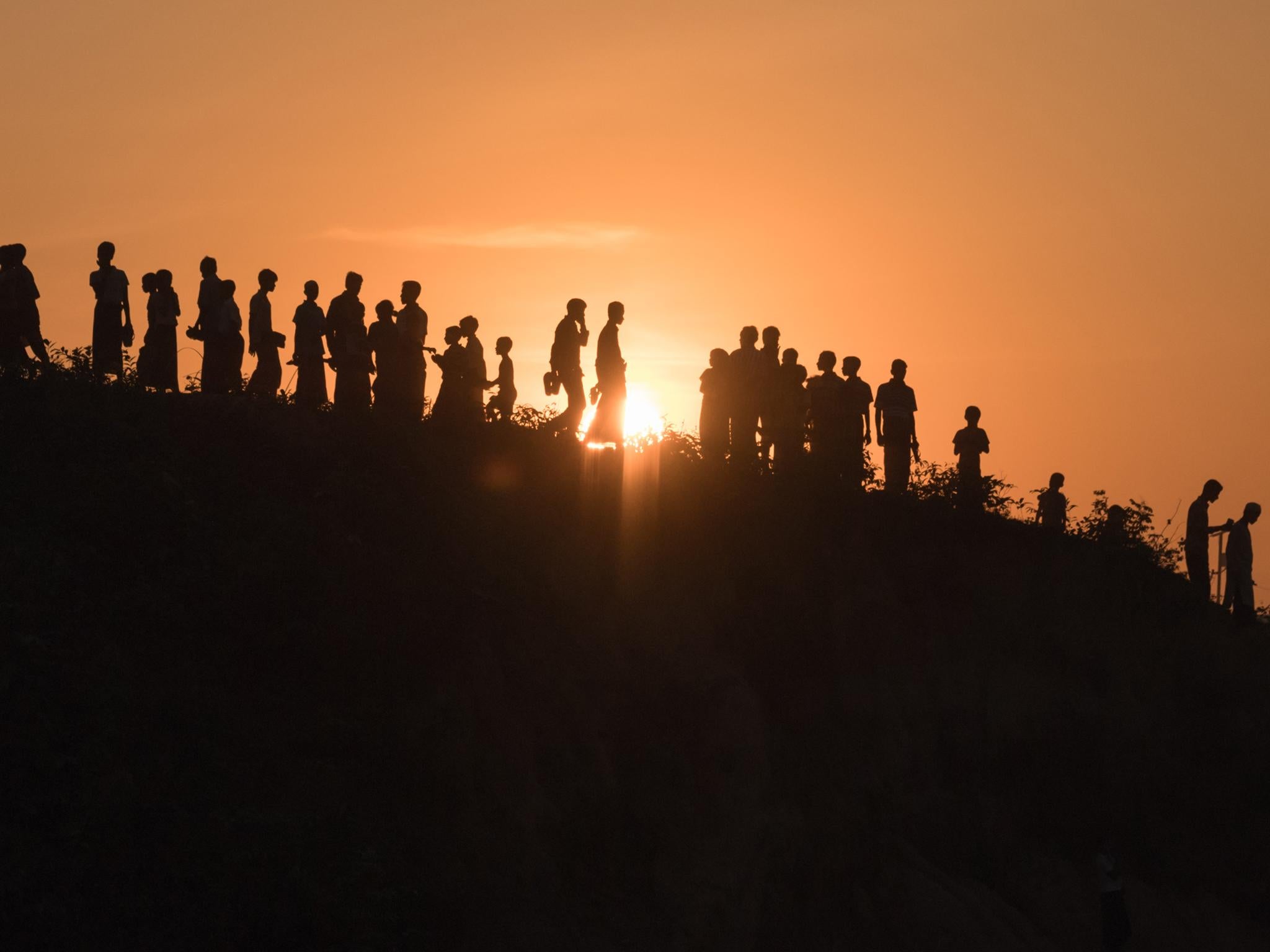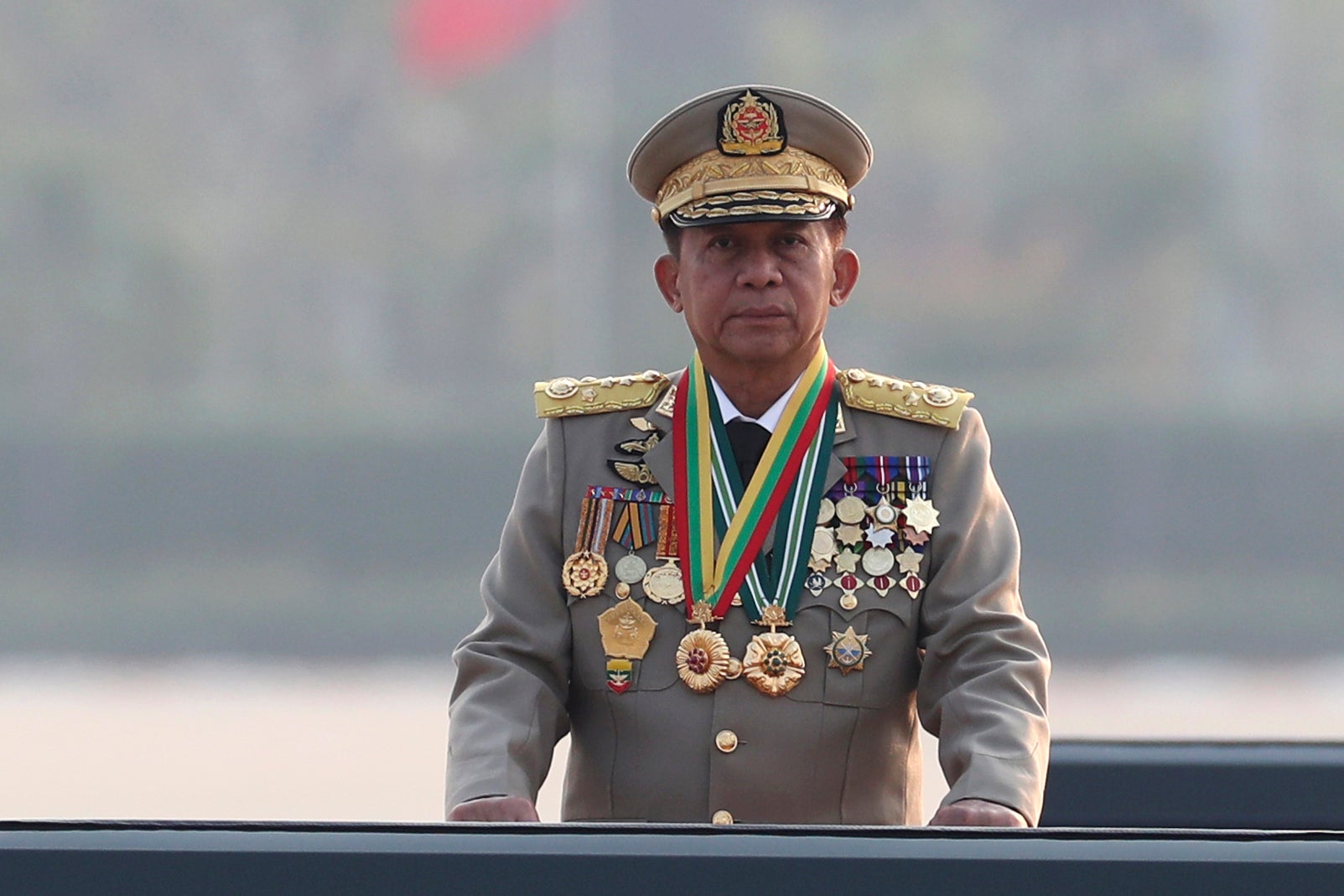ICC arrest warrant sought for Myanmar junta chief over Rohingya persecution
Myanmar’s coup leader Min Aung Hlaing accused of using armed forces to displace and persecute Muslim minority

Your support helps us to tell the story
From reproductive rights to climate change to Big Tech, The Independent is on the ground when the story is developing. Whether it's investigating the financials of Elon Musk's pro-Trump PAC or producing our latest documentary, 'The A Word', which shines a light on the American women fighting for reproductive rights, we know how important it is to parse out the facts from the messaging.
At such a critical moment in US history, we need reporters on the ground. Your donation allows us to keep sending journalists to speak to both sides of the story.
The Independent is trusted by Americans across the entire political spectrum. And unlike many other quality news outlets, we choose not to lock Americans out of our reporting and analysis with paywalls. We believe quality journalism should be available to everyone, paid for by those who can afford it.
Your support makes all the difference.The International Criminal Court’s chief prosecutor has requested an arrest warrant for Myanmar’s military leader for crimes against humanity linked to the persecution of the Rohingya Muslim minority.
General Min Aung Hlaing – who overthrew elected leader Aung San Suu Kyi in a 2021 coup – faces accusations of crimes against humanity for orchestrating the deportation and persecution of the Rohingya minority.
In a statement, the ICC chief prosecutor Karim Khan said that the court has been investigating alleged crimes committed during the 2016 and 2017 waves of violence in Rakhine state, Myanmar, and the subsequent exodus of Rohingya from Myanmar to Bangladesh.
“After an extensive inquiry, the ICC has found reasonable grounds to believe that Senior Gen Min Aung Hlaing is criminally responsible for crimes against humanity, including deportation and persecution of the Rohingya, committed with the involvement of Myanmar’s military and police forces,” Mr Khan said.
The application for his arrest – the first targeting a high-ranking Myanmar official – is supported by witness testimonies, documents, and scientific evidence, with crucial backing from the Rohingya community, the Bangladeshi government, and the UN, the ICC chief prosecutor said.
“More than a million members of their (Rohingya) community have been forced to flee violence in Myanmar. We are grateful to all those who provided testimony and support to my office, those that have shared their stories, those that have given us information and material,” Mr Khan said.

The Myanmar authorities have not yet responded to Mr Khan’s announcement. Min Aung Hlaing has previously denied allegations of persecuting Rohingyas, and rejected claims of involvement in violence in the 2017 crisis. He has claimed that the Myanmar military operation was a legitimate response to attacks by Rohingya militants.
In June this year, UN special rapporteur Thomas Andrews warned that the Rohingya in Myanmar’s Rakhine state faced a renewed risk of “genocidal violence” akin to the 2016-2017 atrocities. Clashes between Myanmar’s military and the Arakan Army – an armed group that advocates for the rights of the Rakhine ethnic minority and aims to achieve greater autonomy for the region – have displaced tens of thousands, with reports of killings, abductions, and property destruction.
The military has forcibly conscripted more than 1,000 Rohingya men and boys despite their lack of citizenship, exacerbating tensions.
Human Rights Watch and the UN have documented serious abuses, including airstrikes and attacks on civilians.
“For Rohingya people – oppressed, scapegoated, exploited, and stuck between warring parties – the situation carries echoes of the lead-up to genocidal violence in 2016 and 2017,” Mr Andrews told the United Nations Human Rights Council in June.
Mr Khan said yesterday: “In my visits to the Kutupalong refugee camp in Cox’s Bazar [in Bangladesh] over the last three years, including just yesterday, I met with Rohingya women who spoke with clarity and purpose about the need for accountability.
“I sat with youth activists who wanted to play their own role in seeking justice. And I spoke with men of all ages including the old and the sick, who were united in demanding to be seen and to have accountability for what befell them. Our work, the work of the International Criminal Court, seeks to vindicate their resilience and their hope in the power of the law.”
ICC judges will now decide if the arrest warrant application meets the required standards and if approved, the court will work with its registrar to facilitate the military leader’s arrest.
Myanmar’s military junta has faced significant sanctions and isolation from Western countries, especially after the 2021 coup and for its role in what has been called the 2017 Rohingya “genocide”.
Yesterday, speaking from a refugee camp in Bangladesh, Mr Khan announced plans to seek additional arrest warrants for Myanmar’s leaders in the near future. “In doing so, we will be demonstrating, together with all of our partners, that the Rohingya have not been forgotten. That they, like all people around the world, are entitled to the protection of the law.”
Join our commenting forum
Join thought-provoking conversations, follow other Independent readers and see their replies
Comments